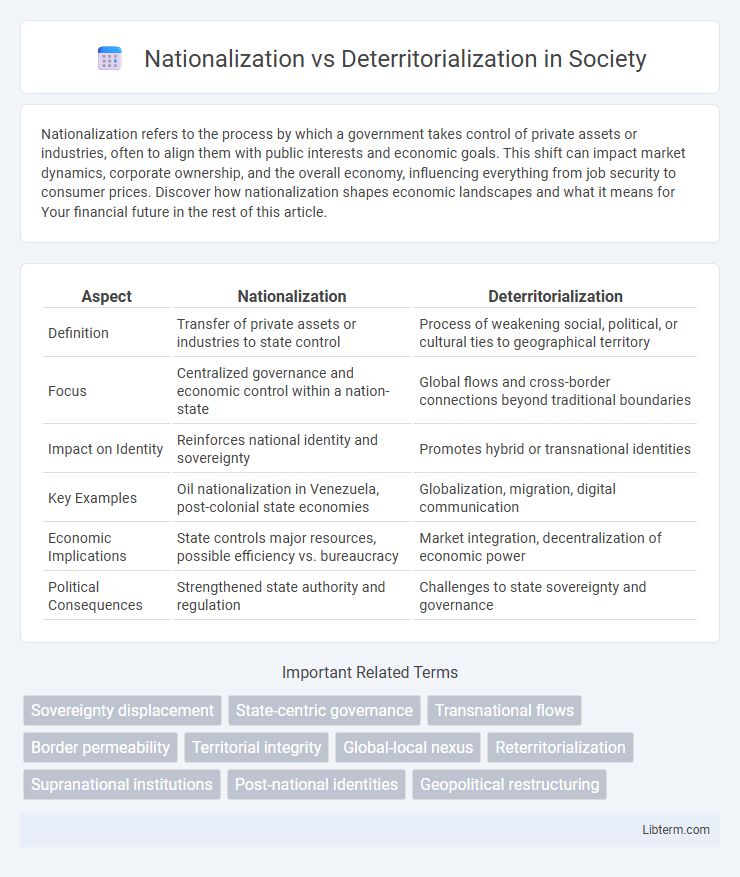Nationalization refers to the process by which a government takes control of private assets or industries, often to align them with public interests and economic goals. This shift can impact market dynamics, corporate ownership, and the overall economy, influencing everything from job security to consumer prices. Discover how nationalization shapes economic landscapes and what it means for Your financial future in the rest of this article.
Table of Comparison
| Aspect | Nationalization | Deterritorialization |
|---|---|---|
| Definition | Transfer of private assets or industries to state control | Process of weakening social, political, or cultural ties to geographical territory |
| Focus | Centralized governance and economic control within a nation-state | Global flows and cross-border connections beyond traditional boundaries |
| Impact on Identity | Reinforces national identity and sovereignty | Promotes hybrid or transnational identities |
| Key Examples | Oil nationalization in Venezuela, post-colonial state economies | Globalization, migration, digital communication |
| Economic Implications | State controls major resources, possible efficiency vs. bureaucracy | Market integration, decentralization of economic power |
| Political Consequences | Strengthened state authority and regulation | Challenges to state sovereignty and governance |
Understanding Nationalization: Definition and Key Concepts
Nationalization refers to the process by which governments take control of private assets, industries, or resources, transferring ownership from the private sector to public entities. This strategic intervention aims to regulate critical sectors such as energy, transportation, and natural resources to secure national interests, ensure economic stability, and promote social welfare. Key concepts include state ownership, economic sovereignty, and regulatory authority, which distinguish nationalization from privatization and influence policy decisions in various geopolitical contexts.
Deterritorialization Explained: Breaking Geographical Boundaries
Deterritorialization involves the process of breaking geographical boundaries by decoupling cultural, social, or economic practices from fixed spatial locations. It enables the flow of ideas, identities, and commodities across traditional national borders, fostering transnational connections and global networks. This concept challenges the dominance of nation-states by emphasizing fluidity, hybridity, and the reconfiguration of space beyond territorial constraints.
Historical Context: Evolution of Nationalization and Deterritorialization
Nationalization emerged primarily in the 19th and 20th centuries as states sought to control key industries and resources, reinforcing sovereignty and economic independence. Deterritorialization, a concept rooted in postmodern and globalization theories from the late 20th century, describes the diminishing importance of territorial boundaries in cultural, economic, and political practices. Historical shifts such as colonialism, decolonization, and globalization have driven the evolution and interplay of nationalization and deterritorialization processes worldwide.
Drivers Behind Nationalization: Motivations and Objectives
Nationalization is driven primarily by the desire to assert state control over strategic industries, protect national interests, and redistribute wealth to achieve economic independence. Governments often pursue nationalization to reduce foreign dependency, ensure resource sovereignty, and promote social equity by managing key sectors such as energy, mining, and transportation. Political motivations include strengthening state authority, fostering economic nationalism, and responding to public demand for greater control over domestic assets.
Factors Fueling Deterritorialization in the Modern Era
Globalization, technological advancements, and digital communication platforms significantly fuel deterritorialization by enabling cultural, economic, and social interactions beyond geographic boundaries. Multinational corporations and transnational networks bypass traditional state controls, accelerating the shift from territorially-bound governance to fluid, cross-border dynamics. Moreover, migration flows and the rise of virtual communities weaken the primacy of nation-states, reshaping identities and political affiliations in the modern era.
Economic Impacts: Comparing Nationalization and Deterritorialization
Nationalization concentrates economic resources and industries under state control, often leading to increased government revenues and potential market inefficiencies due to reduced competition. Deterritorialization, characterized by the dispersion of economic activities across borders, enhances global trade opportunities and innovation but can undermine domestic industries and tax bases. The trade-off between nationalization's economic sovereignty and deterritorialization's integration into global markets shapes policy decisions on economic development and regulatory frameworks.
Political Implications: State Control vs Global Dynamics
Nationalization strengthens state control by asserting sovereignty over key resources and industries, often reinforcing nationalist policies and limiting foreign influence. Deterritorialization challenges traditional state boundaries, promoting global interconnectedness and shifting power dynamics beyond national governments. These opposing forces create tensions between centralized political authority and emerging transnational actors shaping global governance.
Cultural Shifts: Identity, Belonging, and Global Citizenship
Nationalization emphasizes cultural identity and belonging by reinforcing shared histories, languages, and traditions within a defined nation-state, fostering a collective sense of unity and patriotism. Deterritorialization challenges these fixed identities by promoting a transnational perspective where cultural practices and affiliations transcend geographic boundaries, encouraging global citizenship and fluid cultural connections. This shift from territorial-based identity to global interconnectedness redefines notions of belonging, emphasizing hybridity and multicultural engagement over singular national loyalty.
Case Studies: Nationalization vs Deterritorialization in Practice
Case studies of nationalization reveal state-led reclamation of resources, such as Venezuela's oil industry under PDVSA, illustrating sovereignty assertion and economic control. Deterritorialization appears in global digital platforms like Netflix, where content transcends national borders, reflecting cultural fluidity and market expansion beyond territorial confines. These contrasting practices highlight tensions between political-economic sovereignty and globalized, borderless cultural and commercial exchanges.
Future Outlook: Balancing National Interests and Global Integration
Future outlook on nationalization versus deterritorialization highlights the need to balance sovereign interests with global economic integration and digital connectivity. Governments increasingly face challenges in protecting domestic industries and data while fostering cross-border collaboration and innovation. Strategic policies that blend national security concerns with openness to international cooperation will shape sustainable development and geopolitical stability.
Nationalization Infographic

 libterm.com
libterm.com